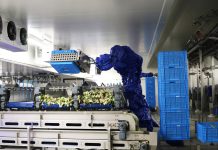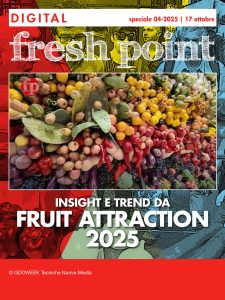Il peperone snack senza semi Angello ha un nuovo partner, Coop Sole (Mediterraneo Group-Gruppo Apofruit), che si occuperà della produzione in Campania della varietà premium sviluppata da Syngenta Vegetable Seeds e commercializzata con il marchio Solarelli. L’obiettivo è ampliare il calendario di vendita soprattutto nel periodo estivo. Il nuovo areale si tradurrà, infatti, in una maggiore disponibilità di volumi per le catene distributive.
 “Siamo partiti tre anni fa con Apofruit, con volumi piccoli legati al mercato invernale, che però è limitante per la gdo- spiega Bruno Busin, product development specialist di Syngenta Vegetable Seeds-, dato che la finestra di vendita va da ottobre ad aprile. C’era pertanto un gap per il periodo estivo. La nuova prospettiva è la possibilità di produrre in Campania, grazie a Coop Sole che lo scorso anno ha fatto dei test con risultati positivi, sia in termini agronomici sia di confezionamento”. L’idea non è di fare volumi elevati, ma aver un prodotto innovativo e distintivo per le filiere: un prodotto convenience, seedless, non mainstream, altamente digeribile, dolce e con ottima shelf-life. “Al momento è prodotto su di 4-5 ettari di superfici per circa 2mila quintali. L’obiettivo è averlo nelle principali catene distributive per il maggior periodo dell’anno. L’obiettivo primario di quest’anno è ampliare la finestra, perché il consumatore lo vuole tutto l’anno. Fino a oggi veniva coltivato da Apofruit nel bacino siciliano di Donnalucata. C’è poi una parte di coltivazione vicino a Cesena, sempre gestita da Apofruit, per la parte tardo estiva. Mancava la parte estiva, che Coop Sole riesce a colmare”.
“Siamo partiti tre anni fa con Apofruit, con volumi piccoli legati al mercato invernale, che però è limitante per la gdo- spiega Bruno Busin, product development specialist di Syngenta Vegetable Seeds-, dato che la finestra di vendita va da ottobre ad aprile. C’era pertanto un gap per il periodo estivo. La nuova prospettiva è la possibilità di produrre in Campania, grazie a Coop Sole che lo scorso anno ha fatto dei test con risultati positivi, sia in termini agronomici sia di confezionamento”. L’idea non è di fare volumi elevati, ma aver un prodotto innovativo e distintivo per le filiere: un prodotto convenience, seedless, non mainstream, altamente digeribile, dolce e con ottima shelf-life. “Al momento è prodotto su di 4-5 ettari di superfici per circa 2mila quintali. L’obiettivo è averlo nelle principali catene distributive per il maggior periodo dell’anno. L’obiettivo primario di quest’anno è ampliare la finestra, perché il consumatore lo vuole tutto l’anno. Fino a oggi veniva coltivato da Apofruit nel bacino siciliano di Donnalucata. C’è poi una parte di coltivazione vicino a Cesena, sempre gestita da Apofruit, per la parte tardo estiva. Mancava la parte estiva, che Coop Sole riesce a colmare”.
Angello ha il plus del prodotto made in Italy, che deve rispettare tutta una serie di restrizioni anche in termini di sostenibilità rispetto al prodotto extra Ue, e porta valore aggiunto. Ma Syngenta è azienda globale e il progetto Angello è sviluppato in tutta Europa. “Ci sono test in corso per le più grandi catene, in Spagna, Nord Europa e attività di ricerca con lo sviluppo di nuove varietà sempre più sostenibili. Poter usare diverse varietà in diverse aree prefigura che siano anche adatte da un punto di vista agronomico. Il contesto campano è molto diverso da quello siciliano. Stiamo pertanto introducendo nuove resistenze nelle nuove varietà, soprattutto per il Tomato spotted. Queste poi si portano dietro maggiore resistenza ai patogeni, con miglioramento dell’impatto agronomico e dell’ambiente”. Novità ci potranno essere in futuro anche sui colori, che potranno essere aggiunti a quelli disponibili, arancio, giallo e rosso. “Stiamo in realtà lavorando anche sugli stessi, per renderli più intensi, con nuance diverse. Il diverso colore significa anche diverso profilo organolettico, per la maggiore presenza di polifenoli, carotenoidi. Anni fa abbiamo introdotto il pomodoro viola, che ha portato curiosità e interesse: l’idea è andare nella stessa direzione”. La coltivazione da parte di Coop Sole è in serre fredde, passive ovvero non riscaldate. “Siamo intorno a 3 ettari di coltivazione -racconta Mario Vicario, tecnico agronomo di Cooperativa Sole-. Utilizziamo colonnine meteo che ci danno informazioni su temperature, umidità, irrigazione. I software sono predittivi e ci dicono la probabilità di sviluppo di malattie, come l’oidio. In Campania un nemico è anche la mosca bianca che in determinati periodi dell’anno ha forte incidenza. Come cooperativa andiamo verso l’ottimizzazione dell’utilizzo di fitofarmaci, con basso uso dei principi attivi. Altro nemico è il caldo. Durante il ciclo estivo Angello è una cultivar che ha bisogno di essere ombreggiata: quest’anno useremo pertanto delle reti”.
Angello snack pepper will also cover the summer period
After Sicily and Cesena region, with Coop Sole the Campania production area is added, with the benefit for large-scale distribution, which will be able to expand the sales calendar of the premium seedless product developed by Syngenta. New, more resilient varieties are being tested, with new colors
Angello seedless snack pepper has a new partner, Coop Sole (Mediterraneo Group-Apofruit Group), which will take care of the production in Campania of the premium variety developed by Syngenta Vegetable Seeds and marketed under Solarelli brand. The goal is to expand the sales calendar especially in the summer period. In fact, the new area will allow greater availability of volumes for distribution chains. Bruno Busin, product development specialist at Syngenta Vegetable Seeds, explained: ‘We started three years ago with Apofruit, with small volumes linked to the winter market, which however is limiting for large-scale distribution, as the sales window goes from October to April. There was therefore a gap for the summer period. The new prospect is the possibility of producing in Campania, thanks to Coop Sole, which last year carried out tests with positive results, both in terms of agronomy and packaging’. The idea is not to produce high volumes, but to have an innovative and distinctive product for the supply chains: a convenience product, seedless, non-mainstream, highly digestible, sweet, and with an excellent shelf-life. ‘At the moment it is produced on 4-5 hectares of surfaces for about 2 thousand quintals. The goal is to have it in the main distribution chains for the majority of the year. The primary goal this year is to expand the window, because the consumers want this product all year round. Up until now it was grown by Apofruit in the Sicilian basin of Donnalucata. Furthermore, there is a part of cultivation near Cesena, always managed by Apofruit, for the late summer production. The summer part was missing; Coop Sole manages to bridge this gap’.
Angello has the plus of made in Italy product, which must respect a whole series of restrictions also in terms of sustainability compared to the extra-EU product, and brings added value. But Syngenta is a global company and the Angello project is developed throughout Europe. ‘There are tests underway for the largest chains, in Spain and Northern Europe, as well as research activities with the development of new, increasingly sustainable varieties. Being able to use different varieties in different areas means that they are also suitable from an agronomic point of view. The Campania context is very different from the Sicilian one. We are therefore introducing new resistances in the new varieties, especially for spotted Tomato. These resistances bring with them greater resistance to pathogens, with improved agronomic and environmental impact’. There may also be new developments in the future regarding colors, which may be added to those available, orange, yellow, and red. ‘We are actually also working just on colors, to make them more intense, with different nuances. Different colors also mean a different organoleptic profile, due to the greater presence of polyphenols and carotenoids. Some years ago, we introduced purple tomato, which generated curiosity and interest: our idea is to go in the same direction’. The cultivation carried out by Coop Sole takes place in cold, passive greenhouses, i.e. not heated. Mario Vicario, agronomist technician of Cooperativa Sole, explained: ‘We have around 3 hectares of cultivation. We use weather columns that give us information on temperatures, humidity, and irrigation. The software is predictive and tells us the probability of disease development, such as powdery mildew. In Campania, an enemy is also white fly, which in certain periods of the year has a strong incidence. As a cooperative we are moving towards optimizing the use of pesticides, with low use of active substances. Another enemy is heat. During the summer cycle, Angello is a cultivar that needs to be shaded: this year we will therefore use nets’.













